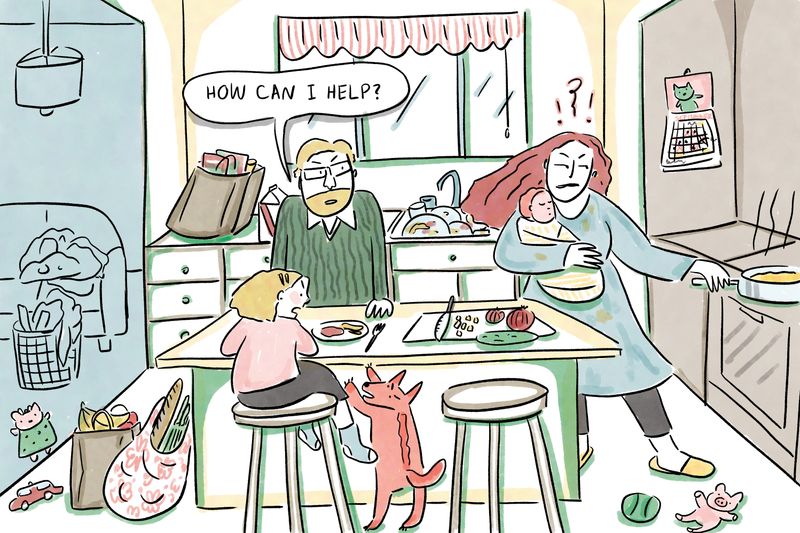21 Telling Signs of a Not-So-Great Husband
Let’s not sugarcoat it: marriage isn’t supposed to feel like a never-ending group project with someone who’s only showing up for the free snacks. A truly great husband lifts you up, not weighs you down like an emotional anchor. But what about the not-so-great ones—the ones they quietly (and loudly) warns us about?
I’ve seen friends stuck with partners who drain their joy faster than a toddler empties a cookie jar. The research doesn’t lie either—certain behaviors consistently predict relationship disaster. Marriage counselors hear the same complaints from unhappy wives year after year, and psychologists have documented the patterns that lead to divorce.
If you’re seeing these signs pop up like red flags at a rollercoaster entrance, well… it might be time to reassess who’s riding shotgun in your life. No judgment—just some reality checks that might save you years of unnecessary heartache.
1. He Thinks Communication Means “Winning” Arguments

Couples who view disagreements as battles are setting themselves up for failure. When your husband treats every discussion like a debate tournament—complete with interrupting, eye-rolling, and the smug victory lap—he’s missing the entire point of communication.
Healthy partners understand that conversations aren’t competitions. They’re opportunities to understand each other better. A husband who needs to crush you verbally isn’t interested in your perspective—he just wants to be right.
This combative approach creates a toxic pattern where you eventually stop sharing your thoughts altogether. Why bother when you know he’ll just shoot you down? Over time, this silence grows into resentment, and resentment is relationship poison.
Studies show that competitive communication is one of the strongest predictors of divorce, right up there with contempt and stonewalling.
2. He’s Allergic to Accountability

Psychologists call it “responsibility aversion”—the persistent inability to admit mistakes or accept blame. Your husband might deflect with humor, change the subject, or flip situations to make you the problem. “If you hadn’t stressed me out, I wouldn’t have forgotten our anniversary!”
Research from relationship experts shows this behavior stems from deep insecurity. A man who can’t say “I messed up” believes admitting fault makes him fundamentally flawed. But this self-protection comes at your expense—you end up questioning your own reality.
The emotional labor falls entirely on you: managing his feelings, excusing his behavior, and somehow still solving the original problem. Marriage counselors warn this imbalance creates a parent-child dynamic rather than an equal partnership.
Without the ability to acknowledge mistakes, genuine growth becomes impossible, and relationships stagnate in patterns of hurt and disappointment.
3. He Prioritizes Everyone (and Everything) Else

When your text messages go unanswered while he immediately responds to his buddy’s football commentary, that’s not just annoying—it’s relationship science in action. Successful marriages require active prioritization, not just leftover attention.
A husband who consistently puts work deadlines, gaming nights, or social obligations ahead of your needs is sending a clear message about where you rank. The problem isn’t about any single instance—it’s the cumulative pattern that researchers find so damaging.
Over time, this behavior creates what psychologists call “emotional malnutrition.” You’re starving for connection while he’s feeding every other relationship and interest in his life.
Researches links this neglect pattern to increased depression in partners and dramatically lower relationship satisfaction. The message becomes painfully clear: everything else matters more than you do.
4. He Makes You Feel Small (Even Casually)

Those “jokes” about your cooking in front of friends? That eye-roll when you share an opinion? According to relationship researchers, these seemingly minor digs qualify as emotional microaggressions—small but poisonous acts that gradually erode your self-worth.
Studies from relationship psychologists show these subtle put-downs can actually cause more lasting damage than obvious insults because they’re harder to identify and address. You start doubting yourself: “Maybe I’m just too sensitive?” Meanwhile, your confidence slowly crumbles.
The research is clear: partners who regularly belittle each other, even in “playful” ways, report significantly lower relationship satisfaction and higher rates of anxiety. What makes this behavior particularly toxic is how it trains you to expect criticism rather than support from the person who should be your biggest fan.
Over time, you might find yourself making yourself smaller to avoid becoming the target of his next “harmless” joke.
5. He Keeps Score Like It’s The Olympics

Marriage researchers call it “contingent exchange”—the toxic belief that relationships should operate like business transactions with perfectly balanced ledgers. Your husband mentally tallies every favor, chore, and compromise, treating marriage like a competition rather than a partnership.
“I took out the trash twice last week, so I shouldn’t have to do it now.” “I let you visit your sister last month, so you owe me a guys’ weekend.” This scorekeeping mentality destroys the generosity that healthy relationships need to survive.
Couples who track and trade favors report lower relationship satisfaction than those who support each other without keeping count. When everything becomes a negotiation, spontaneous acts of love disappear.
The underlying message becomes clear: I’m only giving to get something back. Love researchers warn this transactional approach is particularly damaging because it replaces emotional connection with cold calculation.
6. He Treats Respect Like An Optional Upgrade

Basic respect isn’t a luxury feature in marriage—it’s the essential foundation. Yet some husbands act like it’s an add-on package they didn’t purchase. Respect—or its absence—predicts relationship longevity better than almost any other factor.
The signs appear in seemingly small moments: interrupting you mid-sentence, dismissing your opinions with a wave, or making unilateral decisions about shared finances. These behaviors might seem minor in isolation, but studies show they create a cumulative effect that’s devastating to emotional intimacy.
What makes disrespect particularly harmful is how it normalizes inequality in the relationship. When he consistently signals that your thoughts, feelings, and contributions matter less than his, the relationship tilts dangerously out of balance.
Marriage counselors report that by the time many couples seek therapy, this pattern has become so entrenched that the disrespected partner barely recognizes their own diminished status.
7. He’s Emotionally Locked Up Tighter Than Fort Knox

Relationship researchers call it “emotional withholding”—when a partner creates an impenetrable barrier around their inner world. Your husband might physically be beside you on the couch, but emotionally, he’s living alone on a desert island.
This isn’t about being stoic or reserved. Studies show emotionally unavailable partners actively resist vulnerability, deflecting personal questions with jokes, changing the subject, or retreating into work and hobbies. “I’m fine” becomes his universal response, regardless of what’s actually happening.
This emotional withdrawal often hurts men as much as their partners. While you feel rejected and alone, he’s trapped in self-imposed isolation. Marriage therapists report that emotional unavailability creates a particularly painful paradox—you’re technically together but fundamentally disconnected.
Over time, this emotional vacancy creates what psychologists call “the empty marriage”—a relationship that provides structure without substance.
8. He Dismisses Your Feelings Like Junk Mail

When you express hurt or disappointment, does your husband immediately jump to, “You’re overreacting” or “It’s not that big a deal”? Relationship scientists have a name for this: emotional invalidation. And it’s relationship kryptonite.
Invalidation creates a dangerous cycle. First, your authentic feelings are rejected. Then, you question your own emotional reality. Eventually, you stop sharing altogether. Partners who regularly experience invalidation show similar stress responses to those experiencing more obvious forms of emotional abuse.
This pattern is particularly insidious because it masquerades as rationality. “I’m just being logical” becomes the excuse for dismissing your emotional experience.
Marriage counselors identify this behavior as a major predictor of relationship dissatisfaction because it strikes at the heart of emotional safety. When you can’t trust your partner to honor your feelings, the foundation of intimacy crumbles.
9. He Twists Reality Until You Question Your Sanity

“That never happened.” “You’re remembering it wrong.” “I never said that.” Gaslighting might sound like an outdated term, but research shows this reality-distorting behavior remains shockingly common in marriages.
Psychologists describe gaslighting as a form of manipulation where one partner systematically makes the other doubt their perceptions, memories, and sanity. This behavior creates a particularly devastating form of psychological injury because it attacks your fundamental ability to trust yourself.
The pattern typically escalates gradually. What starts as “You’re too sensitive” evolves into outright denials of things you know happened. Marriage counselors report that many gaslighting victims actually bring notebooks to therapy sessions because they’ve lost confidence in their ability to remember conversations accurately.
The research is unequivocal: this behavior isn’t just unhealthy—it’s a form of emotional abuse that creates lasting psychological damage, including anxiety, depression, and severely diminished self-trust.
10. He’s Only Your Cheerleader When It’s Convenient

Fair-weather support is relationship quicksand. Inconsistent support actually creates more stress than no support at all. Your husband might show up impressively for the big moments—job promotion celebrations or public gatherings where his supportive husband role is visible to others.
But what about when you’re sick with the flu? Or struggling with anxiety? Or simply having an ordinary bad day? Studies show that truly supportive partners provide what psychologists call “responsive caregiving” during both exceptional and mundane challenges.
The research highlights a crucial distinction: genuine support isn’t about grand gestures but consistent presence. When your husband’s supportiveness vanishes the moment it becomes inconvenient or unrewarding for him, it reveals a fundamental misunderstanding of partnership.
Marriage counselors identify this pattern as particularly damaging because it creates unpredictability—you never know if you’ll get the supportive partner or the dismissive one when you reach out for help.
11. He Wields Silence Like A Weapon

The silent treatment isn’t just annoying—it’s a form of emotional manipulation that relationship researchers classify as a control tactic. When your husband refuses to speak to you for hours or days after a disagreement, he’s not “cooling off”—he’s punishing you.
This behavior creates a power imbalance where the silent partner gains control while the other becomes increasingly desperate for resolution. The silent treatment works by exploiting a fundamental human fear: the fear of rejection and abandonment. Even in otherwise healthy adults, being deliberately ignored triggers primal anxiety responses.
What makes this behavior particularly destructive is how it prevents actual problem-solving. Real issues remain unaddressed while you’re forced to focus on regaining basic communication. Marriage counselors report that couples caught in this pattern often find themselves apologizing for bringing up legitimate concerns just to end the painful silence.
The research is clear: partners who regularly use the silent treatment report significantly lower relationship satisfaction and higher rates of divorce.
12. He Treats Your Dreams Like They’re Fiction

Couples who support each other’s personal goals and dreams report 65% higher relationship satisfaction than those who don’t. Yet some husbands consistently dismiss, minimize, or outright mock their partners’ aspirations.
“Going back to school at your age? That’s cute.” “Starting a business? You can barely organize the garage.” These dismissive responses aren’t just hurtful—they reflect a fundamental lack of belief in your capabilities and potential. Studies show this dream-squashing behavior often masks insecurity; he fears your growth might highlight his stagnation.
This pattern is particularly damaging because it forces an impossible choice: pursue your dreams despite active discouragement from your supposed biggest supporter, or abandon your aspirations to keep the peace.
Many women eventually stop sharing their goals altogether, creating a hidden life of deferred dreams that breeds deep resentment. A partner who can’t celebrate your potential isn’t just unsupportive—he’s actively limiting who you can become.
13. He Micromanages Your Life Like A Suspicious Boss

Control in marriages rarely announces itself with dramatic demands. Instead, research from domestic violence prevention centers shows it typically begins with “concerned” questions and suggestions. “Who were you texting just now?” “That outfit might give people the wrong idea.” “I’ll handle the money since you’re not great with numbers.”
Relationship psychologists identify controlling behavior as a spectrum that often escalates gradually. What starts as opinions about your friends or clothes evolves into monitoring your whereabouts, communications, and decisions. Many controlling husbands genuinely believe they’re being protective rather than possessive.
This behavior creates what psychologists call a “shrinking world” effect—your freedom, social connections, and autonomy gradually diminish. Women in controlling relationships often don’t recognize the pattern until they’ve lost significant independence.
Marriage counselors warn that controlling behavior correlates strongly with other forms of emotional abuse and, in some cases, can escalate to physical intimidation when the control is challenged.
14. He Treats Household Duties Like They’re Your Natural Habitat

Unequal division of household labor remains one of the top predictors of marital dissatisfaction and divorce. When your husband acts like laundry and dinner are your biological destiny while he “helps out” occasionally, he’s not just being lazy—he’s reinforcing outdated gender expectations.
Studies show the problem goes beyond physical tasks to include what sociologists call the “mental load”—the exhausting job of noticing, planning, and managing household needs. Your husband might wash dishes when asked, but do you have to ask every single time? Does he notice when you’re out of milk, when permission slips are due, or when the dog needs vaccines?
Women spend an average of 7 more hours weekly on unpaid household work than their male partners, regardless of employment status.
This inequity creates a parent-child dynamic rather than an equal partnership, breeding resentment that psychologists identify as particularly corrosive to intimacy and connection.
15. He’s Frozen In The Same Version As When You Met

Couples who grow together stay together. Yet some husbands seem allergic to personal development, clinging to the same habits, perspectives, and skills they had decades ago. This resistance to growth isn’t just frustrating—it creates an increasing disconnect as partners evolve at different rates.
A husband who refuses to examine his biases, learn new relationship skills, or adapt to changing circumstances forces you into an impossible position. Either you stunt your own growth to stay compatible, or you continue evolving and watch the gap between you widen.
This is what psychologists call “growth resistance”—the tendency to view personal development as unnecessary or threatening. Marriage counselors report that growth-resistant partners often use phrases like “That’s just how I am” or “You knew who you married” to avoid the vulnerability that comes with change.
Studies show this fixed mindset correlates strongly with relationship stagnation, as genuine intimacy requires ongoing curiosity about yourself and your partner.
16. He’s Your Personal Confidence Demolition Expert

Relationship researchers discovered something alarming: partners have unparalleled power to shape each other’s self-image. A husband who consistently criticizes, compares you unfavorably to others, or focuses on your flaws isn’t just being negative—he’s actively rewriting your self-perception.
“You’re lucky to have me, you know.” “Most men wouldn’t put up with your [insert normal human trait].” These subtle undermining comments create what psychologists call “reflected appraisal”—you begin to see yourself through his critical eyes. This erosion of self-worth often happens so gradually that many women don’t recognize how much their confidence has diminished until they’re deeply entrenched in the relationship.
Marriage counselors identify this confidence-undermining behavior as particularly insidious because it creates dependence. As your self-esteem decreases, your reliance on his approval increases, creating a dangerous power imbalance.
There’s a troubling correlation: partners with diminished confidence are significantly more likely to remain in unhealthy relationships because they’ve been convinced they don’t deserve better.
17. He Treats Simple Conversations Like Personal Attacks

Defensiveness is one of the “Four Horsemen” that predict relationship failure with startling accuracy. When your husband responds to simple requests or observations with immediate self-protection, he’s prioritizing his comfort over communication.
“Why are you always criticizing me?” “Nothing I do is ever good enough for you!” These defensive reactions transform ordinary conversations into emotional minefields. Studies show defensiveness typically stems from shame—your husband interprets normal feedback as evidence of his fundamental inadequacy, triggering an automatic self-protective response.
Defensive partners often counter-attack to deflect attention from themselves. Rather than addressing your actual concern, he’ll bring up unrelated issues from the past or criticize you instead.
Marriage counselors report that this behavior creates a communication dead-end where real problems remain perpetually unresolved. Over time, many partners simply stop raising concerns altogether, allowing problems to fester beneath a surface of false peace.
18. You Feel Like The Loneliest Person At A Table For Two

People can feel more profoundly lonely in unhappy marriages than when actually alone. This “married loneliness” creates what psychologists call a “proximity paradox”—the physical presence of your partner actually amplifies your sense of emotional isolation.
The signs are subtle but devastating: sitting together without connecting, going through daily routines like roommates, or feeling that your inner world remains completely unknown to the person sharing your bed. Emotional disconnection often coexists with superficial functionality—the bills get paid, the calendar gets managed, but genuine connection has vanished.
This loneliness is particularly painful because it contradicts our fundamental expectations of partnership. Many people endure this emotional isolation for years, convincing themselves that loneliness is simply the inevitable evolution of long-term relationships.
In reality, studies show that truly healthy partnerships actually increase in emotional intimacy over time, with partners who continue discovering new depths in each other.
19. He Avoids Meaningful Conversations

Ever noticed that your husband seems to prefer silence over meaningful exchanges? This avoidance can signal deeper issues. When conversations are avoided or reduced to monosyllables, it may mean he’s not invested in sharing his life or thoughts.
This often leaves partners feeling isolated, creating a chasm in the relationship. Over time, the lack of communication can erode trust and intimacy.
Addressing this requires patience and understanding, but it’s crucial for rebuilding connection. If left unchecked, this silence can grow louder and more damaging, making it imperative to address these communication barriers.
20. His Criticism Knows No Boundaries

Criticism can be constructive, but when it’s relentless and unfounded, it becomes harmful. If your husband finds fault in everything—from how you do household chores to your choice of friends—it might be time to reevaluate.
Such criticism often stems from insecurities or a desire to control, leaving you perpetually on edge. It erodes self-esteem and breeds resentment.
Healthy relationships thrive on support, not incessant negativity. Recognizing this pattern is the first step. Seeking open dialogue or professional help can be pivotal in transforming destructive criticism into understanding and respect.
21. He Holds Grudges Like Trophies

Some people forgive and forget, but if grudges are your husband’s prized possessions, it spells trouble. Holding on to past grievances can stifle relationship growth.
It often indicates an inability to let go, overshadowing any positive experiences. This behavior creates a tense environment, with past mistakes brought up repeatedly.
A relationship should be a space of growth and forgiveness, not a battleground of unresolved issues. Addressing this requires honest conversations, focusing on building a future rather than reliving the past. Acknowledgment and willingness to move forward are crucial for harmony.







